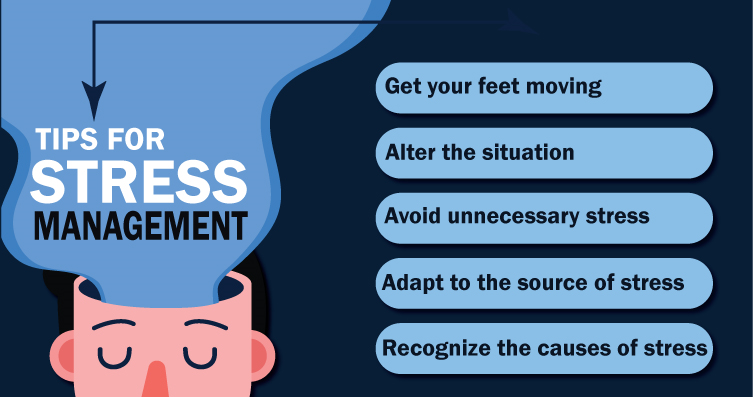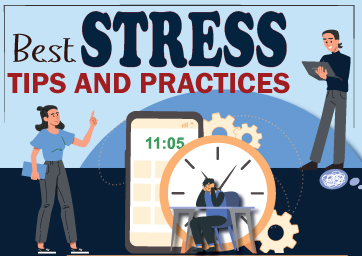What and Why is Stress Management Important?
A lot of stress puts your well-being at risk. Both your emotional and physical well-being are adversely affected by stress. It's difficult to think clearly, work appropriately, and appreciate life when you're in this state. There might seem, by all accounts, to not be anything you can do to alleviate pressure. The bills will come constantly, the days won't ever get any longer, and your work and family obligations won't ever be less requesting. You do, in any case, have undeniably more control than you might suspect.
Stress Management will permit you to break liberated from the hold it has on your life, so you can be more joyful, better, and more useful. The ultimate goal is to live a well-balanced life that includes time for work, relationships, and relaxation. Stress management techniques, on the other hand, is not a one-size-fits-all answer. That is why it is critical to experiment with various ideas to determine what works best for you.
What is stress, exactly?
Stress is defined as a person's "psychological, physiological, and behavioral response when they perceive an imbalance between the demands placed on them and their ability to meet those expectations, which leads to ill-health over time." The stress management tactics described below can assist you in doing so.
Tips for Stress Management

Recognize the causes of stress:
Stress can be overseen by recognizing the wellsprings of stress and uneasiness. This isn't so clear as it shows up. While significant pressure like evolving position, moving, or going through a separation is not difficult to identify, pinpointing the wellsprings of persistent pressure can be more troublesome. It's really not entirely obvious the impact that your own thoughts, sentiments, and conduct have on your day-by-day feelings of anxiety.
Certainly, you might be continually stressed over work cutoff times, yet it's conceivable that the pressure is being brought about by your lingering rather than the real work requests.
Inspect your propensities, mentality, and reasons to decide your actual wellsprings of stress:
Do you legitimize stress as "essentially 1,000,000 things continuing at present" no matter what the way that you can't remember the last time you chose to enjoy some time off?
Do you see stress as an aspect of your responsibilities or home life ("Things are normally occupied around here") or as a character characteristic ("I simply have a great deal of restless energy")?
Do you relate your stress to other people or external events, or do you believe it to be completely typical and unexceptional?
Your stress Management level will stay out of your control until you accept responsibility for your role in creating or managing it.
Use the four A's to help you navigate your stress:
Here we have tried to describe the process for managing emotional stress for your ultimate benefit. While stress is an instinctive nervous system response, some stressors occur at predictable times, such as during your commute to work, a meeting with your employer, or family gatherings. You have two ideas on how to deal with predicted stressors: adjust the issue or change your response. It's useful to remember the four A's while selecting which option to choose in any given circumstance: avoid, adjust, adapt, or accept.
Avoid unnecessary stress:
It's not healthy to avoid dealing with a difficult situation, but you might be amazed at how many stressors you can eliminate from your life.
Learn how to say "no" in a respectful way.
You should avoid people who make you feel worried.
Take control of your environment.
Reduce the number of items on your to-do list.
Alter the situation:
If you can't avoid a difficult situation, try to change it. It is frequently necessary to alter the way you interact and operate in your daily life.
Instead of burying your emotions, express them.
Be willing to make concessions.
Make a schedule that is well-balanced.
Adapt to the source of stress:
If you can't change the stressor, change yourself. You can respond to unpleasant occurrences and take back control by adjusting your expectations and attitude.
It is necessary to reframe issues.
Take a step back to see the bigger picture.
Be flexible with your expectations.
It is important to express gratitude.
Acknowledge what you can't change and go on:
Now and again, stress is unavoidable. It is difficult to stay away from or change stressors like the passing of a friend or family member, a disastrous disease, or a public downturn. In such occurrences, tolerating things as they are is the best method for adapting to pressure. Acknowledgment is troublesome, however, it's superior to shouting about something you can't adjust over the long haul.
Do whatever it takes not to attempt to control something you can't handle.
Watch out for open doors.
Resilience is excellence.
If it's not too much trouble, articulate your thoughts.
Get your feet moving:
Getting up and exercising is likely the last thing on your mind when you're anxious. Physical activity, on the other hand, is fantastic stress management, and you don't have to be an athlete or spend hours at the gym to reap the advantages. Exercise releases endorphins, which make you feel good, and it can also be a fantastic way to divert yourself from your daily troubles.
While routinely exercising for 30 minutes or more will provide the most benefit, it's fine to gradually increase your fitness level. Over the course of a day, even minor acts can accumulate. Get up and move as quickly as possible.
Use stress therapy methods that are beneficial:
It's a good idea to be aware of any unhealthy coping patterns you have going on so you can substitute them with something healthier. If overeating is your current go-to, for example, you could try meditation or call a friend to talk things over. According to the American Psychological Association, it is most effective to alter one habit at a time.
Prioritize your self-care:
We value our own well-being when we set aside time for ourselves. This may feel self-centered at first, but it's similar to the airplane analogy: we must first put our own oxygen mask on before helping others. Simple things, such as getting enough sleep, can help you feel better.
When needed, seek assistance:
Reach out to a friend or family member if you're feeling overwhelmed. Speaking with a health expert can also help us acquire healthy coping mechanisms and reduce stress.
Exercises & Ways to Relieve Stress
While almost any type of physical activity can help to relieve tension and stress management plans, rhythmic activities are particularly beneficial. Walking, running, swimming, dancing, cycling, tai chi, and aerobics are all excellent options. But whatever you select, make sure it's something you'll enjoy doing so you can stick with it.
Make an effort to pay attention to your body and the physical (and occasionally emotional) experiences you have when exercising. Consider how the air or sunlight feels on your skin, or how to coordinate your breathing with your motions. Including this mindfulness component can assist you in breaking free from the negative mental cycle that typically accompanies overwhelming stress.
Diet Plans
Stress reactivity can be exacerbated by a poor diet. Emotional eating and grabbing for high-fat, high-sugar foods can bring a short-term sensation of relief, but they will only add to your long-term stress.Cookies and potato chips, for example, might increase blood sugar to surge. You may feel more stressed and anxious if your blood sugar levels drop.
Over time, eating a balanced diet might help you deal with stress. Mood management and energy balance are helped by foods like eggs, avocado, and walnuts.Other healthy lifestyle choices, in addition to regular exercise, can help you to become more stress resistant.
Consume a well-balanced meal plan:
Be attentive of what you consume because well-nourished bodies are better able to cope with stress. Start your day well with breakfast, and eat balanced, nutritious meals throughout the day to keep your energy up and your mind clear.
Caffeine and sugar consumption should be reduced:
Caffeine and sugar produce momentary "highs," but they usually come with a mood and energy fall. You'll feel more calm and sleep better if you cut down on the quantity of coffee, soft drinks, chocolate, and sugary foods you consume.
Avoid drinking, smoking, and using illegal substances:
Self-medicating with alcohol or drugs may seem like a quick stress buster, but the relaxation is just temporary.Deal with difficulties directly on and with a clear mind, rather than avoiding or masking them.
Practice Progressive Muscle Relaxation
Progressive muscle relaxation requires relaxing each of your body's muscular groups one by one. Begin by taking a few deep breaths to warm up.
Then, starting with your forehead and working your way down to your toes, practise tightening and relaxing each muscle group.
You'll be able to recognise muscle tension and tightness with practice, and you'll be able to relax more easily. However, each time you practise, you should feel a wave of relaxation rush over your body.
Focus on Breathing
Basically focusing on your breath or changing the manner in which you inhale can radically diminish your general feeling of anxiety. In only a couple of moments, breathing strategies might alleviate your body and psyche.
There are numerous different breathing activities, for example, karate breathing, yet the following are a couple of straightforward ones:
Breathe in profoundly through your nose, and notice how your belly extends. While breathing in, gradually build up to three. Hold briefly prior to building up to three again while gradually breathing out through your nose.
Breathe in quiet, quiet air through your nose. Consider how the air is coursing all through your whole body. As you breathe out, envision breathing worry and nervousness.
Manage your time better
Our days will eat us alive if we allow them. The months will have flown by before we know it. Our lives become less hectic and more joyful when we prioritize and manage our tasks. Boundaries are the restrictions that we make for ourselves on a daily basis. They spell out which behaviors we will accept and which we will reject, as well as how much time and space we require from people and our priorities.
Connect to Others
Stress management goals is aided by having supporting people in your life. It's critical to obtain emotional and social support if you don't already have it.
Reaching out to your existing network could be one way to accomplish this. Perhaps confiding in a family member or distant acquaintance will help you grow closer and provide the social support you require.
It's possible that you'll have to broaden your network as well. If you lack supporting people in your life, join an organization, attend a support group, or seek professional treatment.



 Contact Us
Contact Us







 Hospitals
Hospitals
 Doctors
Doctors
 Diagnostic
Diagnostic
 Pharmacy
Pharmacy
 Health Tips
Health Tips
 Blog
Blog


















Comments